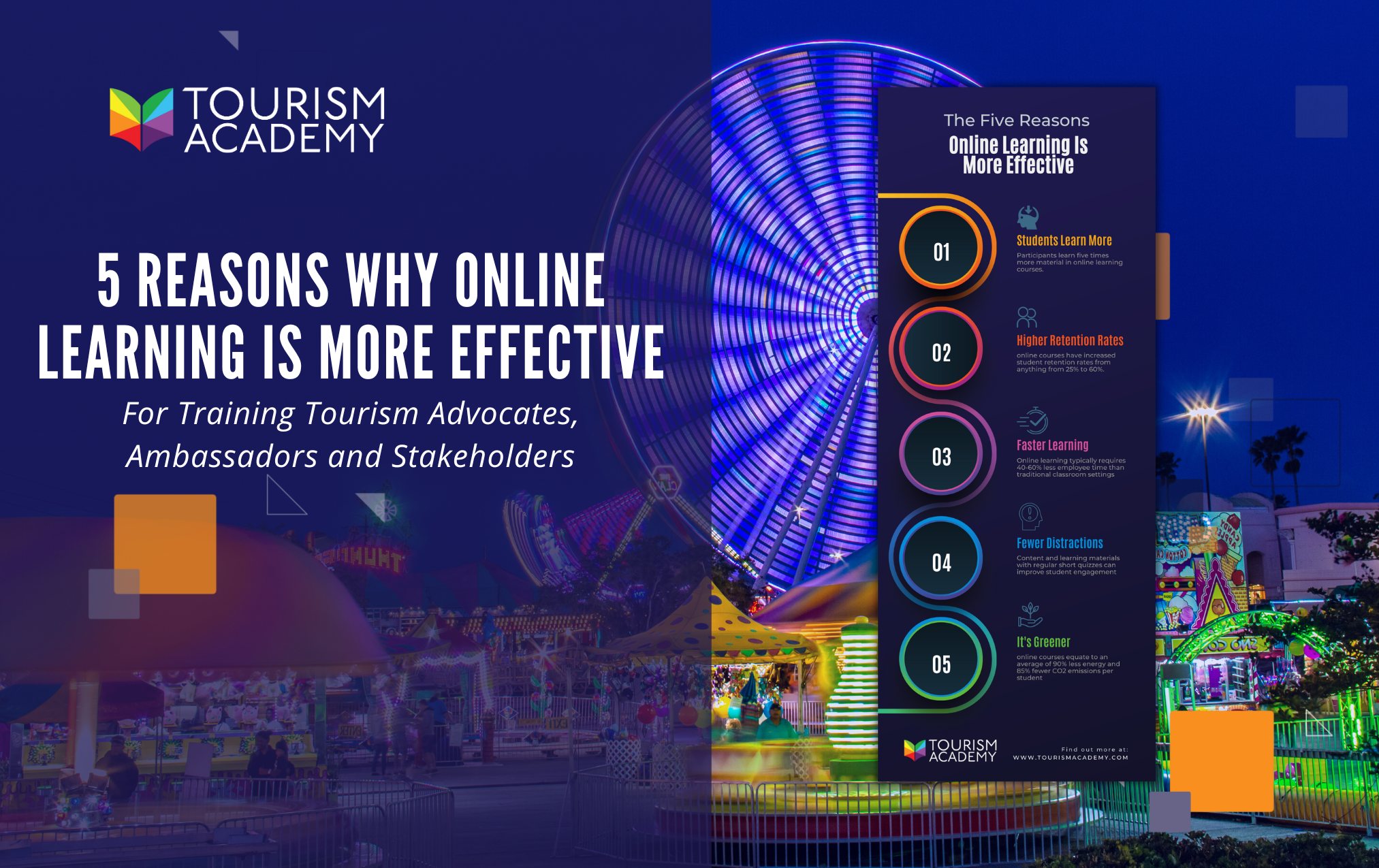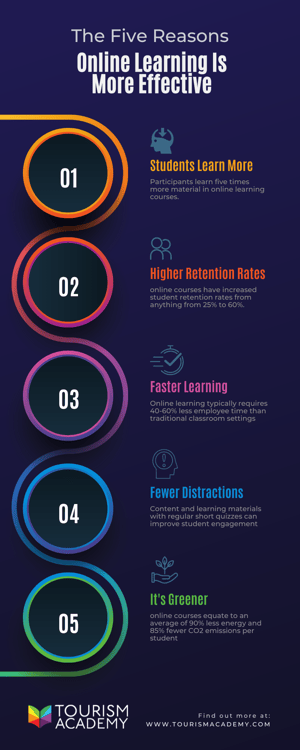
INFOGRAPHIC - 5 Reasons Why Online Tourism Training is More Effective
 Online education has experienced remarkable growth in recent years, and the reasons behind its surge in popularity are compelling. The emergence of eLearning courses can be attributed to their inherent convenience, distinguishing them from traditional face-to-face learning methods. This trend has been amplified by the emergence of innovative platforms like The Tourism Academy, which offers specialized training for tourism ambassadors.
Online education has experienced remarkable growth in recent years, and the reasons behind its surge in popularity are compelling. The emergence of eLearning courses can be attributed to their inherent convenience, distinguishing them from traditional face-to-face learning methods. This trend has been amplified by the emergence of innovative platforms like The Tourism Academy, which offers specialized training for tourism ambassadors.
In contrast to the constraints of physical attendance, eLearning courses offer students the flexibility to tailor their studies around pre-existing commitments. The allure of multimedia content and learning materials that can be accessed at one's convenience further solidifies the appeal of online learning. What's even more remarkable is that learners can engage in these courses without the need for travel; the virtual campus is accessible from the comforts of their own homes or offices.
Affordability is another driving force behind the ascendancy of online learning. The cost-effectiveness of online education mitigates the financial barriers that often deter individuals from enrolling in desired courses. This economic advantage also extends to corporations, as they can provide comprehensive training to their employees without being hamstrung by the costs associated with conferences and conventional training programs. The dynamic offered by platforms such as The Tourism Academy, which specializes in tourism ambassador training, exemplifies the accessibility of online learning even within constrained budgets.
Beyond convenience and cost-effectiveness, the efficacy of online learning is a pivotal factor fueling its popularity. Learners genuinely desire to enhance their comprehension, acquire new skills, and attain valuable qualifications are drawn to courses that offer optimal effectiveness. Notably, The Tourism Academy is a testament to this trend by providing a cutting-edge approach to training tourism ambassadors through its online platform.
Here are five compelling reasons why online learning often surpasses traditional face-to-face training courses:
#1. Amplified Learning: Research conducted by entities such as IBM reveals that participants in online learning courses, especially those integrated with multimedia content, grasp five times more material than their counterparts in traditional classroom settings. The autonomy afforded by online courses enables learners to pace their studies, leading to accelerated progress and enhanced retention.
#2. Elevated Retention Rates: Unlike conventional courses that struggle to retain participants, online learning experiences exhibit impressive student retention rates ranging from 25% to 60%, according to the Research Institute of America. Engaging multimedia content, individualized learning approaches, and reduced scheduling conflicts contribute to this higher retention.
#3. Time-Efficient: A common deterrent to face-to-face courses is the substantial time investment required for commuting, waiting for tutors, and peer interactions. Evidently, eLearning demands 40-60% less employee time, as the Brandon Hall Group reported. The flexibility inherent in online courses empowers learners to manage their time effectively, even if they can only allocate brief intervals to their studies.
#4. Continuous Assessment Minimizes Distractions: One of the strengths of online courses lies in the seamless integration of ongoing assessments. This practice not only boosts student engagement but also curbs distractions. Studies from institutions like Harvard reveal that interspersing multimedia content with frequent short tests reduces distractions by half and significantly enhances content retention.
#5. Eco-Friendly Approach: While eLearning proves advantageous for learners, it also benefits the environment. The Open University in Britain highlights that online courses consume approximately 90% less energy and generate 85% fewer CO2 emissions per student than traditional in-person courses. This environmental consciousness aligns well with the overarching goals of sustainable education.
The amalgamation of these factors underscores the efficacy of online learning. As exemplified by initiatives like The Tourism Academy and its tourism ambassador training, this mode of education empowers individuals. It fosters a responsible approach toward both personal and corporate learning objectives. By harnessing the potential of eLearning and multimedia content, learners can embark on an immersive educational journey that transcends traditional boundaries.

Leave a comment